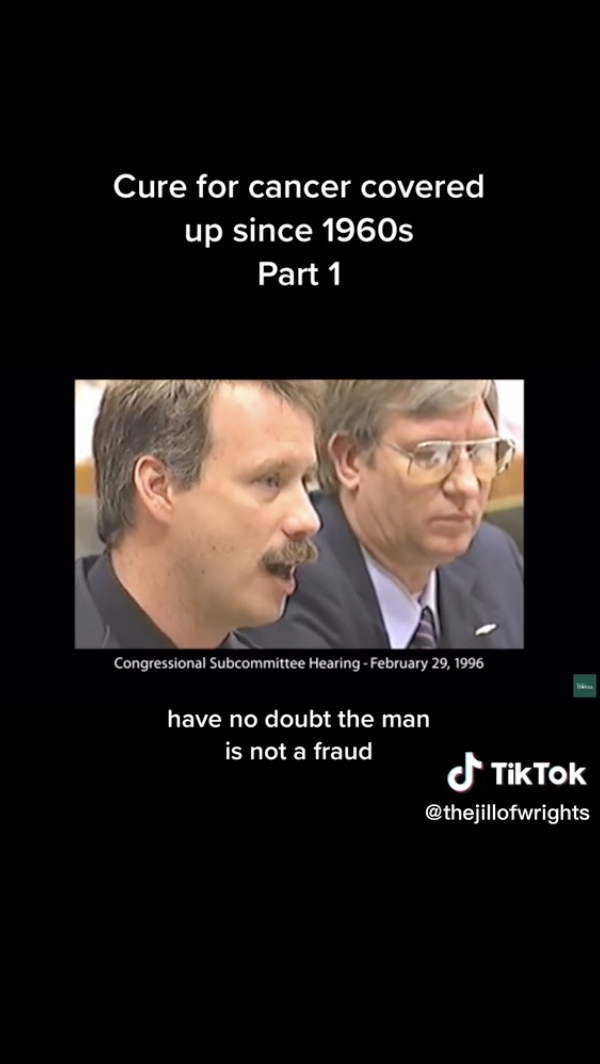
Is antineoplaston therapy developed by Dr. Stanislaw Burzynski an effective cure for cancer? No, that's not true: There is not sufficient evidence that antineoplaston therapy -- an alternative type of cancer treatment using drugs that are composed of chemical compounds found naturally in human blood and urine -- is an effective cure for cancer. The U.S. Food and Drug Administration has not approved antineoplastons for the prevention or treatment of any disease.
The claim appeared in a video published on TikTok on February 12, 2023, titled "Cure For Cancer Covered Up Since 1960s" with following description:
A safe, non-toxic and highly effective treatment for cancer was developed in the 1960s by Dr. Burzynski and has been continually covered up and roadblocked by the FDA. Watch the full documentary on the Real Stories youtube channel. Title: Cancer Cure Cover-Up? #foryou #fyp #documentary #realstories #cancer #cancercure #burzynski #burzynskicancercure #youtube #partone
Users on social media only saw this title, description and thumbnail:
Jill on TikTok
A safe, non-toxic and highly effective treatment for cancer was developed in the 1960s by Dr. Burzynski and has been continually covered up and roadblocked by the FDA. Watch the full documentary on the Real Stories youtube channel. Title: Cancer Cure Cover-Up? #foryou #fyp #documentary #realstories #cancer #cancercure #burzynski #burzynskicancercure #youtube #partone
This is how the TikTok post appeared at the time of writing:
(Image source: Instagram screenshot taken on Tues Feb 14 12:43:16 2023 UTC)
There is no cure for cancer, and the therapy that was created by Burzynski has not been found to treat or cure the disease. He first proposed the treatment which he named "antineoplastons" in the 1970s. He hypothesized that the treatment was able to aid the immune system's response to cancer. Decades of research have not scientifically proved his claims.
The footage shown in the TikTok video is from a U.S. Congress Committee on Commerce: Subcommittee on Oversight and Investigations hearing on February 29, 1996. The video was included in a documentary on Burzynski released in 2010.
According to the National Cancer Institute, "Antineoplastons are an experimental cancer therapy developed by S.R. Burzynski, MD, PhD. Chemically, antineoplastons are a mixture of amino acid derivatives, peptides, and amino acids found in human blood and urine," Burzynski claims this therapy can cure cancer. The therapy is not a cure for cancer and he has been cited by the FDA in multiple cases where there were reported bad reactions to the treatment by patients.
The National Cancer Institute website section titled, "Antineoplastons (PDQ®)-Health Professional Version," describes the therapy as follows:
Antineoplastons are drugs composed of chemical compounds that are naturally present in the urine and blood. They are an experimental cancer therapy that is purported to provide a natural biochemical substance that is excreted and, therefore, lacking in people with cancer.
The Cancer Institute website states they are not approved treatment for any disease:
Antineoplastons are not approved by the U.S. Food and Drug Administration for the prevention or treatment of any disease.
No randomized controlled trials showing the effectiveness of antineoplastons have been published in the peer-reviewed scientific literature.
The National Cancer Institute also states:
No phase III, randomized, controlled trials of antineoplastons as a treatment for cancer have been done.
The Memorial Sloan Kettering Cancer Center website includes a section dedicated to antineoplastons and says there is "insufficient evidence" to support the theory that they promote the body's natural defenses against cancer:
There is a lack of evidence to support any anticancer effects of antineoplastons in humans.
Antineoplastons are compounds that were first isolated from human urine and blood by Stanislaw Burzynski. He claims that they promote the body's natural defenses against cancer. However, there is insufficient evidence to support this theory. Adverse reactions from antineoplaston treatment include confusion, sleepiness, worsening of seizures, headache, vomiting, and fatigue.
Cancer Research UK states, "There is not enough reliable evidence that it can help to treat cancer," about antineoplaston therapy.
The nonprofit organization noted that the positive results of antineoplaston therapy were only found in Burzynski's study and were not replicated in independent clinical trials:
Most of the researchers that have reported positive results are associated with Dr Burzynski's clinic. These were case reports, and phase I or II clinical trials. Other researchers could not get the same results. So, they couldn't show that this type of treatment helps to treat cancer.
Health Feedback reported that there were negative side effects from the therapy and, "clinical trials for antineoplastons were halted due to serious problems that endangered the lives of patients."


















